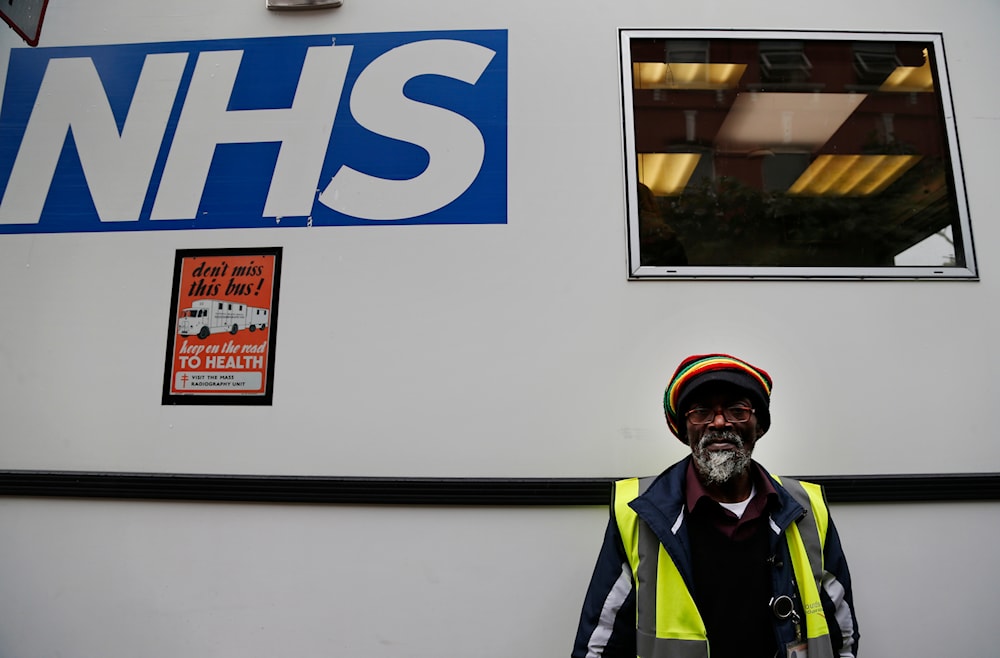Mental illness costs England £300bn a year, almost double NHS budget
A report concluded that the cost of mental illness in 2022 is equal to almost double the NHS’s complete £153 billion 2022 budget.
-

In this Wednesday, October 16, 2013 photo, volunteer Horace Reid, 58, waits outside an X-ray van, parked outside a homeless shelter, in London. (AP)
After researching the economic, health, and care effects of mental health disorders and human costs from reduced quality of life and well-being, the Centre for Mental Health think-tank revealed that mental illness costs England £300 billion a year, equivalent to almost double its NHS budget.
In 2022, mental illness cost £130 billion in human expenses, £110 billion in economic expenses, and £60 billion in health and care expenses, according to the report commissioned by the NHS Confederation’s mental health network.
As England's public sector costs were at £25 billion and those of the business sector at £101 billion, the biggest financial effect at £175 billion falls on those struggling with mental health issues and their families.
The report deduced that the £300 billion cost in 2022 is equal to almost double the NHS’s complete £153 billion budget for the same year and is a "comparable impact, economically, to having a pandemic every year."
It highlighted that this number can even be considered an underestimate as not all impacts of mental health issues were taken into consideration. If researchers were to include the £10 billion to £16 billion cost of physical and mental health comorbidities, and the £2.1 billion cost of mentally ill prisoners, an increase in its total would be evident.
Presenteeism, staff turnover, and lost tax revenues
The report, for the first time, further analyzed broader financial effects of mental illness such as presenteeism, staff turnover and lost tax revenues due to economic inactivity.
Presenteeism, which is when damaged cognitive functions and emotional distress triggered by mental health issues render someone less productive at work, costs £41.8 billion, and staff turnover because of mental illness costs £43.1 billion, while lost tax revenues cost £5.7 billion.
Deteriorating mental health
Referrals to NHS mental health services in England increased to 44% between 2016-17 and from 4.4 million to 6.4 million in 2021-22. During the same interval, the number of people seeking assistance from mental health services also increased from 3.6 million to 4.5 million, as revealed by the National Audit Office.
The Department of Health and Social Care also announced that mental health makes up just 9% of NHS expenses, even though it occupies 23% of the "burden of disease."
Growing concern
The Chief Executive of the Centre for Mental Health, Andy Bell, emphasized that ministers "cannot afford to ignore the devastating impact of mental ill health", adding, "A pound sign can never fully reflect the suffering caused by mental ill health."
"Rising inequality, austerity, and cuts to early support have contributed to a nation with overall poorer mental health, and have led to more people reaching crisis point before they get support," Bell stressed.
The NHS Confederation’s mental health network chief executive, Sean Duggan, further highlighted this message as he stressed "The false economy of failing to invest in mental health is making the country poorer and causing unspoken anguish to so many people and their loved ones. It is vital that we now invest in effective interventions that bring us closer to a mentally healthier nation for all."
NHS scandal: 20,000 mental health patients ‘raped, sexually assaulted'
Allegations of rape and sexual assault by mental health patients within the NHS surfaced on January 30.
A joint investigation by Sky News and The Independent revealed almost 20,000 reports of sexual assault, abuse, and harassment, involving patients and staff, spanning over 30 mental health trusts in England since 2019.
The inquiry was initiated following the testimony of Alexis Quinn, a former British youth swimmer, shared in the new Sky News podcast, Patient 11 after Quinn fled psychiatric care amid claims of sexual assault by male patients.
The study defines sexual safety incidents as any unwanted sexual behavior causing discomfort or a sense of insecurity, encompassing rape, sexual assault, harassment, sexual comments, or witnessing sexual behavior, including exposure to nudity.
Between January and August 2023, almost 4,000 sexual safety incidents were reported, surpassing the annual totals for both 2019 and 2020, according to the investigation, which involved over 50 freedom of information requests to NHS England mental health trusts.

 4 Min Read
4 Min Read








